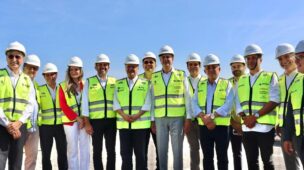Tempo de leitura: 5 minutos
In geopolitics, free zones and other types of special economic zones used to facilitate global trade and investment usually fly under the radar. However, these commercial entities, in which the rules of business are laxer than those in the national territory, are fast becoming prominent features of controversial strategic partnerships emerging across the Middle East. In turn, beyond serving as commercial incubators for select industries, free zones have now started to act as bellwethers for the geopolitical and economic reconfigurations underway across the broader Middle East.
That’s particularly true when it comes to relations between Israel and the United Arab Emirates. Following the announcement of a normalization agreement between the two in August, Israeli Prime Minister Benjamin Netanyahu mentioned that his country would import from the UAE free zones, saying that “we know that we will get good prices,” and hinting that further engagement would follow.
Israel may be turning over a new leaf with the UAE, but its ties to free zones aren’t anything new. Israel has long engaged with similar Qualifying Industrial Zones in Egypt and Jordan—the result of a program authorized by the U.S. Congress in 1996 to strengthen ties between Israel and its neighboring Arab states. These free zone-related entities permit Egyptian and Jordanian firms to export to the United States duty-free, provided that the exported products contain inputs from Israel. The latest cooperation over free zones follows an older trend in which economic partnerships prefigure better relations.
The emirate of Dubai, widely considered the Gulf’s de facto free zone hub, is using its flagship commercial entities to cement ties with Israeli counterparts. In September, DP World—the Dubai-based multinational logistics company—and other government-related entities signed multiple agreements with Israel-based DoverTower Group, a shareholder of the Israel Shipyards port in Haifa and a partner in Eilat Port. DP World plans to assess port and free zone development opportunities in Israel as well as establish a direct shipping route between Eilat and the UAE port of Jebel Ali.
Moreover, the Israel Diamond Exchange and the Dubai Diamond Exchange, which is part of the government-owned Dubai Multi Commodities Centre free zone, inked an agreement to enhance cooperation in the diamond trade. The Jebel Ali Free Zone and Dubai Airport Free Zone Authority both signed memorandums of understanding with the Federation of Israeli Chambers of Commerce in late September to support Israeli companies intending to establish businesses in Dubai.
The involvement of free zones in geopolitical reconfigurations is not restricted to the Persian Gulf states. Plans by Iran and China to formalize a 25-year strategic partnership include Chinese commitments to develop Iranian free zones in Maku, Abadan, and Qeshm Island. In 2019, a state-owned Chinese oil-trading company imported Iranian oil into what is known as bonded storage—a component of free zones—in China so that the oil would not pass through customs or appear on national import records. The Trump administration nevertheless imposed economic sanctions on the associated Chinese oil-trading company.
Free zones and other megaprojects with free zone characteristics are also crucial channels for foreign direct investment flows into the Middle East. Chinese firms have invested or pledged billions of dollars for projects in Abu Dhabi’s Khalifa Port Free Trade Zone and the special economic zone in Duqm, Oman. The Russian ambassador to Egypt set high expectations that a Russian industrial zone in the Suez Canal Economic Zone would attract $7 billion in new investments. Actual investments, however, can be slow to materialize after the completion of signing ceremonies.
Several factors explain why free zones have moved to the forefront of geopolitical relations in the broader Middle East. First, there is a widely held perception that free zones reduce risks associated with entering new markets. Marketing strategies depict free zones as politically neutral commercial gateways with seamless and cost-effective services. Host governments may create free zones and other forms of special economic zones to gauge the effects of potential economic reforms—such as easing local ownership requirements—or to develop new industries. In this respect, governments and policymakers may treat free zones as commercial litmus tests.
Second, free zones attract a wide array of local, regional, and international economic actors. This diversity of players can shield individual governments from criticism relating to new international relationships, for example between Gulf states and Israel. Global business actors operating in Gulf free zones also enjoy preferential business incentives, which include greater ownership rights, lax labor regulations, and exemptions from customs duties and taxes.
Third, free zones are already prominent structural components of the Middle East’s political economy, especially that of the Gulf region. In Dubai, for example, investors can choose between dozens of operating free zones, and the emirate’s 50-year charter sets out its vision of a virtual commercial city that can host 100,000 firms. Saudi Arabia’s Neom—a megaproject-cum-free zone in northwest of the country—stretches the bounds of national sovereignty by aspiring to incorporate nearby Egyptian and Jordanian territories.
Saudi policymakers have also proposed free zones along Saudi Arabia’s borders with Yemen and Iraq, presumably to advance its objectives in those countries. The Qatar Free Zones Authority aims to offer “state of the art infrastructure” next to Hamad Port and Hamad International Airport, while Omani free zones ostensibly seek to promote growth in underdeveloped parts of the country.






Os comentários foram encerrados, mas trackbacks e pingbacks estão abertos.